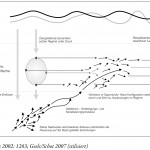20. Oktober 2017
In diesen Tagen ist mein Artikel »Open-source projects as incubators of innovation: From niche phenomenon to integral part of the industry« in Convergence erschienen:
Over the last 20 years, open-source development has become an integral part of the software industry. Against this backdrop, this article seeks to develop a systematic overview of open-source communities and their socio-economic contexts. I begin with a reconstruction of the genesis of open-source software projects and their changing relationships to established information technology companies. This is followed by the identification of four ideal-type variants of current open-source projects that differ significantly in their modes of coordination and the degree of corporate involvement. Further, I examine why open-source projects lost their subversive connotations while, in contrast to former cases of collective invention, remaining viable beyond the initial phase of innovation.
6. Juli 2017
Aus: Dolata, Ulrich / Schrape, Jan-Felix (2018): Kollektivität und Macht im Internet. Wiesbaden: Springer VS (S. 24–30).
Vieles, was Bewegungen und Gemeinschaften auszeichnet, hat sich mittlerweile [in den Online-Bereich] verschoben: kollektive Meinungsbildung und Abstimmung, politische Kampagnen und Mobilisierung, Organisierung und Koordination der Aktivitäten, fachlicher Austausch und gemeinschaftliche Produktion.
Die genannten sozialen Merkmale der Institutionalisierung kollektiver Akteure werden dadurch zwar nicht außer Kraft gesetzt. Sie werden allerdings substanziell erweitert um neue Organisierungs- und Strukturierungsleistungen von Kommunikation, Produktion und Protest, die das Internet und seine Plattformen als technologische Infrastrukturen bieten.
Dementsprechend lässt sich die Institutionalisierung des Kollektiven heute nicht mehr als rein sozialer, sondern nur noch als soziotechnischer Prozess auf angemessene Weise abbilden: als systematische Verschränkung von sozialen und technischen Organisierungs- und Strukturierungsleistungen, deren Zusammenspiel allerdings von Fall zu Fall erheblich variiert […].
Weiterlesen »
17. Juni 2017
Anfang Juli erscheint das von mir und Ulrich Dolata zusammengestellte Buch »Kollektivität und Macht im Internet: Soziale Bewegungen – Open Source Communities – Internetkonzerne« (Amazon, 19,90 Euro). Das Einführungskapitel lässt sich schon jetzt als Leseprobe bei Springer VS herunterladen.

Das Buch geht den Fragen nach, wie sich die vielfältigen neuartigen Formen von Kollektivität in der Internetgesellschaft voneinander unterscheiden und typisieren lassen und welche Rolle die technischen Infrastrukturen des Netzes für deren Entstehung bzw. Verstetigung spielen. Es wird diskutiert, auf welche Weise sich die Mobilisierung und Organisierung sozialer Bewegungen durch Social Media verändert, wie Arbeits- und Entscheidungsprozesse in Open-Source-Communities strukturiert sind und über welche ökonomische und regelsetzende Macht die großen Internetkonzerne als wesentliche Gatekeeper und Kuratoren der Kommunikation im Netz heute verfügen.
14. Mai 2017
In der Reihe Stuttgarter Beiträge zur Organisations- und Innovationssoziologie ist ein neues Discussion Paper mit dem Titel »Open Source Projects as Incubators of Innovation. From Niche Phenomenon to Integral Part of the Software Industry« (Volltext) erschienen:
Over the last 20 years, open source development has become an integral part of the software industry and a key component of the innovation strategies of all major IT providers. Against this backdrop, this paper seeks to develop a systematic overview of open source communities and their socio-economic contexts. […] Further, I examine why open source projects have mainly lost their subversive potential while, in contrast to former cases of collective invention, remaining viable beyond the emergence of predominant solutions and their commercial exploitation: In an industry that is characterized by very short innovation cycles, open source projects have proven to be important incubators for new product lines and branch-defining infrastructures. They do not compete against classical forms of production but instead complement and expand these.
Zum Text »
9. Februar 2017
In der Berliner Debatte Initial 27(4) ist in diesen Tagen der Artikel »Big Data: Informatisierung der Gesellschaft 4.0« erschienen. Nachfolgend einige kleine Ausschnitte aus dem Schlusskapitel.
In der Langzeitbetrachtung wird deutlich, dass sich im aktuellen Diskurs um die gesellschaftlichen Folgen von ›Big Data‹ viele der dystopischen und utopischen Erwartungen widerspiegeln, die bereits seit den 1960er-Jahren an digitale Massendaten und Datenfluten geknüpft worden sind […]. Nach der Emergenz der Idee einer Informationsgesellschaft im Kontext der akademischen Urbarmachung von Computern in den 1960er- und 1970er-Jahren (1. Phase), einer ersten Welle der Informatisierung der alltäglichen Lebenswelt in den 1980er- und 1990er-Jahren (2. Phase) sowie dem Aufstieg der Datenkonzerne und der zeitgleichen diskursiven Betonung der ermöglichenden Eigenschaften der Plattformen im Web 2.0 in den 2000er-Jahren (3. Phase) rücken seit 2010 explizit Massendaten sowie die Fragen nach ihrer Kontrolle und Auswertung in den Mittelpunkt der gesellschaftsweiten Diskussion um neue Informations- und Kommunikationstechnologien (4. Phase).
Weiterlesen »
21. Dezember 2016
In der aktuellen Ausgabe der Zeitschrift Technikfolgenabschätzung – Theorie und Praxis bespricht Christoph Schneider meinen Band »Open-Source-Projekte als Utopie, Methode und Innovationsstrategie« (Amazon) wie folgt:
[…] Jan-Felix Schrape nimmt sich in seinem angenehm kurzen und gut strukturierten Büchlein dem wahrscheinlich einflussreichsten Ursprungsort der heutigen digitalen ›Offenheit‹ an: Der Open-Source- Software-Entwicklung. […]
Weiterlesen »
1. Dezember 2016
In den WSI Mitteilungen 8/2016 ist heute der Artikel »Open-Source-Projekte: vom Nischenphänomen zum integralen Bestandteil der Softwareindustrie« erschienen, der die Ergebnisse meiner Studie zur Entwicklung von quelloffenen Softwareprojekten zusammenfasst, aktualisiert und in einen gesellschaftspolitischen Kontext stellt:
 Weiterlesen »
Weiterlesen »
















